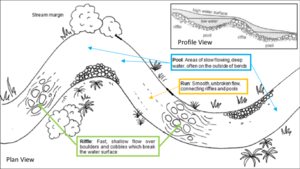Stream pool: различия между версиями
| Строка 5: | Строка 5: | ||
==Stream pool (pool)== | ==Stream pool (pool)== | ||
| − | + | Pools may span the channel, hosting tranquil or standing flow at low flow stage. Alluvial pools are alternating deep areas of channel along an undulating longitudinal bed profile. | |
| + | |||
| + | Pools tend to be narrower than riffles and act as sediment storage zones. These forms tend to occur at characteristic locations, typically along the concave bank of bends in sinuous alluvial channels. | ||
| + | |||
| + | At high flow stage, when flow converges through pools, decreased roughness and greater bed shear stresses induce scour and flushing of sediment stored on the bed. Subcritical flow occurs at low flow stage, when divergent flow occurs. Pool-infilling subsequently occurs, as pools act as areas of deep, low flow velocity and near-standing water conditions. Pools and riffles are genetically-linked in alluvial rivers. Velocity reversal at high flow stage maintains these features.<ref>Leys K. Geomorphology and river management: applications of the river styles framework, by Gary J. Brierley and Kirstie A. Fryirs. Blackwell Publishing, Oxford, December 2004. 398pp. Price £39.95. <nowiki>ISBN 1-4051-1516-5</nowiki> (paperback). // Aquatic Conservation: Marine and Freshwater Ecosystems. – 2006. – Т. 16. – № 1. <nowiki>https://doi.org/10.1002/aqc.727</nowiki>.</ref> | ||
==Пример использования термина на английском языке== | ==Пример использования термина на английском языке== | ||
Версия 04:54, 15 апреля 2022

Плёс (плёсовый участок)
Участок реки достаточно большой протяженности, отличающийся большими глубинами, выдержанностью их по длине, отсутствием крупных гряд – перекатов. Характерны для врезанных русел, сужений днища долины, местам расположения русла вдоль выровненных в плане коренных берегов, обычно сложных трудноразмываемыми горными породами или отложениями.[2]
Stream pool (pool)
Pools may span the channel, hosting tranquil or standing flow at low flow stage. Alluvial pools are alternating deep areas of channel along an undulating longitudinal bed profile.
Pools tend to be narrower than riffles and act as sediment storage zones. These forms tend to occur at characteristic locations, typically along the concave bank of bends in sinuous alluvial channels.
At high flow stage, when flow converges through pools, decreased roughness and greater bed shear stresses induce scour and flushing of sediment stored on the bed. Subcritical flow occurs at low flow stage, when divergent flow occurs. Pool-infilling subsequently occurs, as pools act as areas of deep, low flow velocity and near-standing water conditions. Pools and riffles are genetically-linked in alluvial rivers. Velocity reversal at high flow stage maintains these features.[3]
Пример использования термина на английском языке
1) These physical conditions significantly influence solute transport behavior, as demonstrated by a transient storage model simulation of solute transport in a very small (0.0125 m3s−1) mountain pool‐and‐riffle stream[4]
Перевод использования на русском языке
1) Эти физические условия существенно влияют на поведение переноса растворенных веществ, что продемонстрировано моделированием переноса растворенных веществ в очень маленькой (0,0125 м3/с−1) плесово-перекатной системе горной рекис помощью модели временного хранения.
Список литературы
- ↑ Fuller J.E. Defining Ordinary and Natural Conditions for State Navigability Determinations. – 2018. – № January. – P. 136.
- ↑ Чалов Р.С. Толковый терминологический и понятийный словарь-справочник по русловедению. – Москва, 2022. – 95 с.
- ↑ Leys K. Geomorphology and river management: applications of the river styles framework, by Gary J. Brierley and Kirstie A. Fryirs. Blackwell Publishing, Oxford, December 2004. 398pp. Price £39.95. ISBN 1-4051-1516-5 (paperback). // Aquatic Conservation: Marine and Freshwater Ecosystems. – 2006. – Т. 16. – № 1. https://doi.org/10.1002/aqc.727.
- ↑ Bencala K.E., Walters R.A. Simulation of solute transport in a mountain pool‐and‐riffle stream: A transient storage model // Water Resources Research. – 1983. – Т. 19. – № 3. https://doi.org/10.1029/WR019i003p00718.